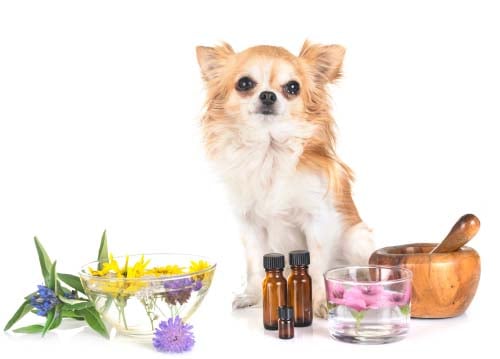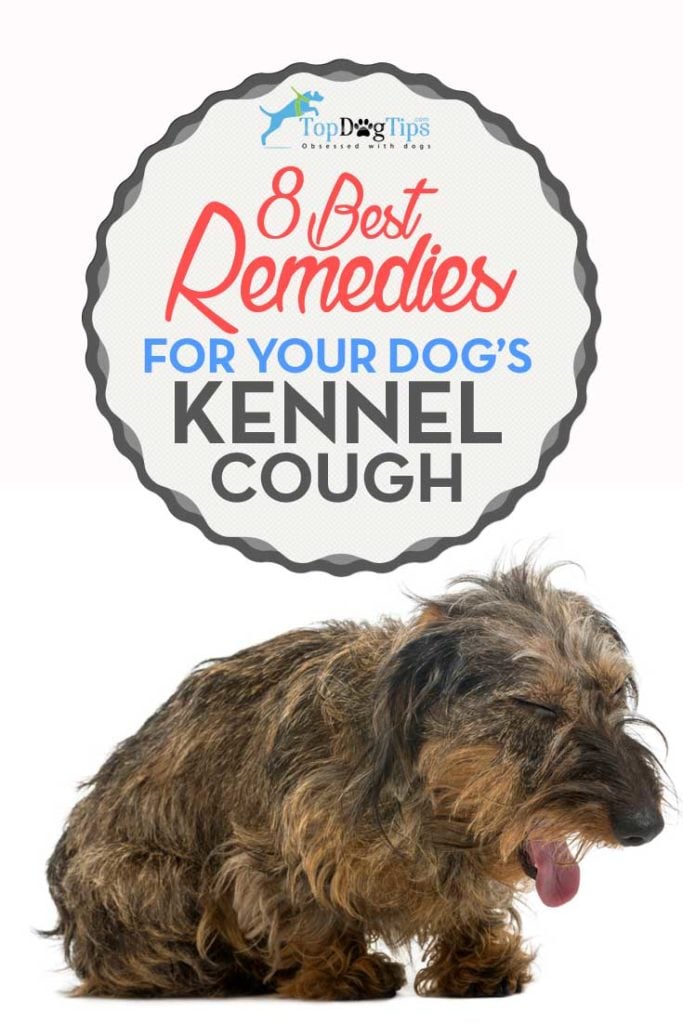Known as infectious tracheobronchitis or canine infectious respiratory disease (CIRD), kennel cough in dogs is a type of respiratory infection caused by a number of different viruses and infectious agents: canine parainfluenza virus (SV5), canine adenovirus 2, Bordetella bronchiseptica, and mycoplasma (1, 2).
Table of Contents
When several dogs are contained in one space (like daycare, boarding kennels, animal shelters, veterinary hospitals) and new pets are regularly introduced, kennel cough will be caused by a complex of pathogens (3, 4, 5).
When pets are densely housed, these pathogens get transmitted from dog to dog by sneezing, coughing, and nose-to-nose contact (6, 7).
Pathogens will attack the cilia protecting a dog's respiratory tract and cause the upper airway to become inflamed (8).
As a result, this causes irritation, which then results in a dog's dry, harsh and hacking cough (9, 10).
In most cases, kennel cough will be mild and go away on its own in about a week (11).
You can give your dog cough suppressants in the meantime.
In more rare instances, a case of kennel cough can progress to pneumonia which is life-threatening.
Antibiotics will be needed, and in some cases, hospitalization may be required as well (12).
The main difference between a harmless kennel cough and a dangerous one (pneumonia) is the way your dog appears and any additional symptoms.
In simple cases, dogs will only have a dry cough, while those with pneumonia will appear very sick, may have fever, lose their appetite, and they're going to be listless (13).
To prevent kennel cough, a dog must be vaccinated.
New vaccines are very effective at keeping most common infectious agents at bay (14, 15, 16).
This is especially important if you're going to put a dog in a “problem kennel” (with other animals).
If your pet has already developed kennel cough, and the case is mild, there are some home remedies you can try to ease their discomfort.
Below are eight of them you can try.
8 Home Remedies for Dog's Kennel Cough
1. Raw Honey
Honey has many proven benefits, and it has been used for different ailments in animals for centuries (17).
In both animal and human trials, it was also shown to be effective at suppressing coughing (18, 19).
If your adult dog has a mild case of kennel cough, try a teaspoon of raw honey to alleviate the cough, runny eyes, and goobery nose.
Honey is a natural anti-inflammatory, and helps fight viruses and bacteria in the body.
Its properties makes it the most effective of home remedies for dog kennel cough.
It’s important to use raw honey so that all of its medicinal properties haven't been cooked out by the pasteurizing process.
You can also purchase honey specially made for dogs, such as the K9 Honey ($21.17).
Note: Only use honey if your dog is over the age of 2.
Puppies don’t handle the sugars well, and it can affect their stomach, digestive tract, and teeth.
For all other dogs, don’t give them more than a single teaspoon a day until you see how your pet reacts, and discontinue if you notice weight gain, stomach problems, or other new symptoms.
2. Essential Oils
Essential oils are everywhere, just like coconut oil, and many of them of were shown to be effective for coughing (20).
For dogs with kennel cough, you can spray their crate with a little blend of eucalyptus, oregano, and lavender, which may help to reduce the coughing and disinfect the air.
The most popular essential oils for treating different coughs are:
- Peppermint (21)
- Thyme (22, 23)
- Nutmeg (24)
- Eucalyptus (25, 26)
- Lavender (27)
- Bergamot (28)
- Cinnamon (29)
- Cypress (30)
- Rosemary (31)
- Geranium (32)
You can spray them around wherever your dog is lying, and the oils can also be used topically when appropriate.
You can also add the oils to a diffuser.
It's like a mini humidifier that mixes the oils with water vapor and disperses them through the air.
It's much easier to get your pet to breathe in the oils than to ingest them.
Note: While some essential oils are helpful, others could be harmful. Consult a holistic veterinarian to assist you with these remedies for dog's kennel cough, as there are hundreds of oils and blends to choose from.
3. Cinnamon
Cinnamon has medicinal and antiviral properties, and has been used as a remedy for different health issues (33, 34, 35, 36).
It's safe for dogs and was even shown to help with lowering blood pressure to its baseline and improving heart problems (37, 38).
It can also serve as a home remedy for kennel cough and suppress coughing.
Simply sprinkle about a half-teaspoon on your dog’s food.
If your dog does not appreciate the smell of cinnamon, getting the food a little wet, then mixing in the cinnamon, and letting the food get soft may help.
4. Coconut Oil
Coconut oil is all the rage lately, and for good reason – it provides many benefits to dogs.
Its medium-chain triglycerides have medicinal properties, some of which can extend into suppressing coughing and more (39, 40, 41).
Dogs with kennel cough (and healthy dogs) can consume about a tablespoon of coconut oil a day mixed with food, or just plain.
Coconut oil kills bacteria, viruses, and fungi.
You can continue adding it to your dog’s food even after they recover from kennel cough to help ward off other health problems in the future.
5. Humidifiers
If you live in an especially dry area, the humidifier can make a world of difference.
You can also use essential oils alongside it to reap even more benefits.
Putting a humidifier near your dog’s kennel or bed will help moisturize the air, which means that your dog’s cough will be a little less dry and less uncomfortable.
It also helps prevent their nose and eyes from getting dried out from all that running.
6. Steam Treatments
Just like when a kid has crud stuck in their lungs, having your dog sit in the steamy bathroom while you shower can help loosen up gunk and get those coughs to be a little more productive.
It's like sitting in a room with a giant humidifier.
Steam helps to expand the dog's lungs, which gets more oxygen and nutrients flowing through the body.
You can also put your dog’s bedding in the bathroom and sit on the floor with them while the hot water is running for about 30 minutes.
7. Water
Make sure your dog is staying hydrated. Water is also important in flushing out toxins.
If your pet doesn’t want to drink water, try some techniques to entice them. You can also try giving your pet a few ice cubes to chew on.
You can also add a bit of bone broth to the water to make it more appetizing.
One great trick is to make ice cubes out of diluted beef or chicken broth.
Your dog will think it's a treat and eat it while also getting hydrated at the same time.
8. Rest
One of the most important things you can do is encourage your pooch to rest.
Keep your dog in a quiet area of the house, away from kids and other pets (especially since your dog is contagious to other animals right now).
Provide home remedies for the dog's kennel cough, but make sure your pet stays calm for as long as the symptoms last.
Home Remedies for Kennel Cough
So we just talked about some home remedies for kennel cough. Kennel cough is a super common illness that affects mostly puppies.
If you're like me it sounds scary, but we are here to reassure you that it can be treated from home as long as it is a mild case.
All of these treatments are methods that will help, but may not cure it:
- Raw honey
- Essential oils
- Cinnamon
- Coconut oil could help
- Get a humidifier for your dog's cough
- Steam treatments
- Water
- Rest
These are all great places to start when you hear the notable “honking” cough and how to address it.
Let us know in the comments which one worked for you!
READ NEXT: 9 Ways to Treat Kennel Cough in Dogs (Based on Science)
Disclosure: We may earn affiliate commissions at no cost to you from the links on this page. This did not affect our assessment of products. Read more here and find full disclosure here.
















